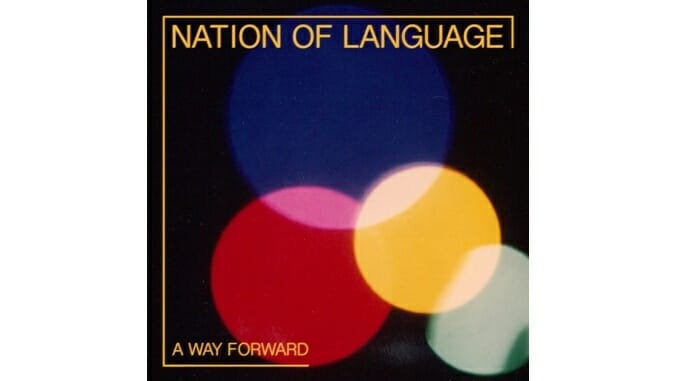Even Defeat Sounds Euphoric on Nation of Language’s A Way Forward
The Brooklyn trio live up to the hype of their debut album

We almost didn’t get to hear Brooklyn band Nation of Language’s stunning 2020 debut Introduction, Presence. Like many bands, Ian Devaney, Aidan Noel and Michael Sue-Poi struggled financially, until Noel and Devaney got married and asked their loved ones to fund their album as a wedding present. And now, thanks to the unexpected (but totally deserved) success of their first album, we’re being graced with A Way Forward, a carefully constructed and emotionally resonant sophomore effort.
Nation of Language excel in their use of juxtaposition throughout the album. “In Manhattan” sounds starry-eyed thanks to Devaney’s soaring vocals and ultra-neon synth; you can imagine upturned faces admiring the rising skyscrapers of the titular borough. The lyrics tell a different story, though: “Strung along by a fiction / From a movie screen / In Manhattan / You cannot have it all.” The contrast between the disillusioned words and hopeful melody magnifies the song’s bittersweetness.
Likewise, “The Grey Commute” focuses on less-than-sunny subject matter: rampant capitalism and all of its dire consequences. Devaney captures the struggle of the everyday worker heartachingly well as he sings, “Broken hands, begging at the altar of the grey commute / Some of the weight / We can’t carry it.” The song itself is a verifiable bop, though, with pitter-pattering drum machine and synth urging along the bassline. The bridge climbs into the stratosphere, expansive in a way that is slightly reminiscent of The War On Drugs. The upbeat elements of “The Grey Commute” make it something of a “Trojan horse,” as Devaney put it in a press release. Well, consider the city sieged.
The songs that are more straightforward in tone hit the mark, as well, namely “Former Self.” The track is by far their darkest to date, with every added element creating an even murkier sense of doom and sadness. At one point Spanish guitar kicks in, trading the limelight with little synth ditties in an ongoing instrumental conversation. “Away from you, I cover it well, but I may crumble, I can’t stop myself,” Devaney laments. His former self keeps telling him he deserves better, but entropy feels inevitable. At the same time, the song is so mesmerizing that you’re tempted to lose yourself, as well.
-

-

-

-

-

-

-

-

-

-

-

-

-

-

-

-

-

-

-

-

-

-

-

-

-

-

-

-

-

-

-

-

-

-

-

-

-

-

-

-








































